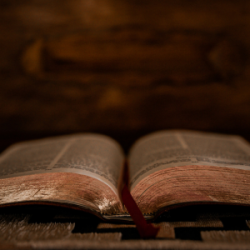Welcome readers! Please subscribe through the button on the right.
(Read this series from its beginning here.)

In Say to This Mountain by Ched Myers, Marie Dennis, Joseph Nangle, Cynthia Moe-Lobeda, and Stuart Taylor, the authors write,
“The experience of wilderness is common to the vast majority of people in the world. Their reality is at the margins of almost everything that is defined by the modern Western world as ‘the good life.’ This wilderness has not been created by accident. It is the result of a system stacked against many people and their communities, whose lives and resources are exploited to benefit a very small minority at the centers of power and privilege. It is created by lifestyles that deplete and pollute natural resources . . . Wilderness is the residue of war and greed and injustice.” (Say to This Mountain: Mark’s Story of Discipleship, p. 11)
Advent begins by birthing hope within people who live in the wildernesses of their society: it tells them that their lived experience on the margins of any society is not the result of divine will but the result of social, political, economic and religious forces wielded by the privileged and the powerful in our communities.
Our reading from Luke this week corrects a conflation of passages we first read in Mark’s gospel:
The beginning of the good news about Jesus the Messiah, the Son of God, as it is written in Isaiah the prophet:
“I will send my messenger ahead of you,
who will prepare your way” —
“a voice of one calling in the wilderness,
‘Prepare the way for the Lord,
make straight paths for him.’ ” (Mark 1:1-3)
These words were not from the same source but from Exodus, Malachi, and Isaiah.
“See, I am sending an angel ahead of you to guard you along the way and to bring you to the place I have prepared.” (Exodus 23:20)
I will send my messenger, who will prepare the way before me. Then suddenly the Lord you are seeking will come to his temple; the messenger of the covenant, whom you desire, will come,” says the LORD Almighty. (Malachi 3:1)
These words from Exodus speak of the liberation of Hebrew slaves and those from other groups who left Egypt with them. I question what the indigenous peoples of Canaan thought about this, given the history of how this same narrative was used against indigenous people here in America. We must be careful to remember that the liberation of one community should not mean the genocide of another.
The context of the passage from Malachi is God coming to God’s temple opposing “those who defraud laborers of their wages, who oppress the widows and the fatherless, and deprive the foreigners among you of justice” (Malachi 3:5). Because of this passage, I think of those today who must work more than 40 hours each week for less pay than they need to on .
Luke’s gospel drops these references to Exodus and Malachi and keep only the passage from Isaiah, though Luke will use the passage from Exodus and Malachi later in the Jesus story to refer to John:
“This is the one about whom it is written: ‘I will send my messenger ahead of you, who will prepare your way before you.” (Luke 7:27)
The passage in Isaiah reads, “A voice of one calling: In the wilderness prepare the way for the LORD; make straight in the desert a highway for our God. Every valley shall be raised up, every mountain and hill made low; the rough ground shall become level, the rugged places a plain.”
Both John and Jesus emerge from the margins of their society and come to liberate oppressed people and restore justice to them. The gospels describe John as the forerunner for the reign of God that Jesus taught. Jesus came calling for change. But change doesn’t just happen.
Before any social change has ever taken place, years of groundwork has been laid. Many of those who did that initial ground work never lived long enough to see the fruit of their labor. They worked for a generation yet to come. Change doesn’t always take that long either: we can always choose change today.
I think of present day examples. We’ll begin with those, next.
(Read part 3)













